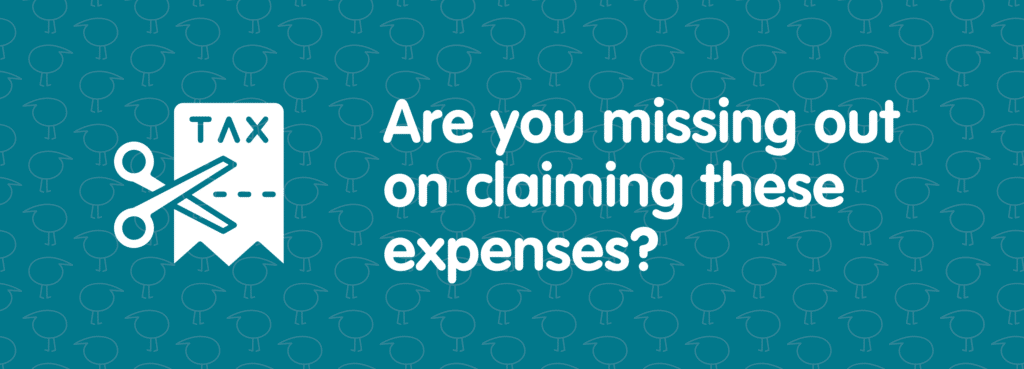
Business owners and property investors often miss out on expense claims simply because they aren’t aware of them.
Here’s a run-down of commonly overlooked tax deductions that you might be able to claim:
1. Home Office Expenses
If you use part of your home for business or managing your property portfolio, you can claim a portion of household costs, such as:
- Rent or mortgage interest
- Power and internet bills
- Rates
- Insurance
- Repairs and maintenance
Make sure to calculate the percentage of your home that is used for business purposes.
Note: Those who use property managers for their rental(s) would claim 100% of those fees as an expense instead of claiming home office expenses.
2. Vehicle and Travel Costs
Do you use your car for work or to visit investment properties? You may be able to claim:
- Fuel, maintenance, and repairs
- Insurance and registration
- Depreciation (for owned vehicles)
For mixed personal and business use, only the business portion is deductible, so keeping a logbook is essential.
Note: Driving to and from home to work is considered a personal trip, therefore cannot be claimed.
3. Professional Development and Training
Courses, workshops, and even books that enhance your skills or knowledge in your field are often tax-deductible. For example:
- Business management training
- Property investment seminars
- Certification renewals
Notes:
- The training needs to be in the same field you are currently operating in
- Training costs incurred before business activity cannot be claimed.
4. Loan Interest
If you’ve taken out a loan to finance your business or purchase an investment property, the interest portion of the repayments is usually deductible. This doesn’t apply to personal loans or the principal repayments, so proper record-keeping is key.
Property Investors Note: As of April 1st 2024 (FY25), property investors can claim 80% of their interest expenses. This increases to 100% on April 1, 2025 (FY26). Read more about the limitations and the recent changes implemented by the National Government.
5. Marketing and Advertising
From Google Ads campaigns to flyers, any effort to promote your business or rental property can be claimed. This includes costs for:
- Website maintenance, changes and hosting
- Social media advertising
- Branded merchandise and collateral e.g. business cards
6. Legal and Professional Fees
Engaging professionals can provide peace of mind and is often tax-deductible. Consider:
- Legal fees for drafting lease agreements
- Accountant fees for tax preparation 😉
- Consultancy fees for business growth
7. Insurance
Insurance premiums (what you pay for your insurance cover) related to your business or investment properties are deductible. This includes:
- Public liability insurance
- Business interruption insurance
- Landlord insurance for rental properties
8. Depreciation on Assets
Do you know the wear and tear on assets like tools, furniture, or IT equipment is a claimable expense? Commonly overlooked items include:
- Office chairs and desks
- Appliances in rental properties e.g. dishwasher
- Business software
- Your website, branding and domain
Check out our article dedicated to demystifying depreciation.
9. Meals and Entertainment
Entertainment expenses are a common area of confusion. These expenses can range from food and drinks to corporate events, trips, and accommodations. The key rule is that the expense must help generate business income to be deductible. But with specific rules and varying deductibility rates, it’s crucial to understand how these apply to your situation.
Read our article that explains the rules around claiming entertainment expenses.
10. Repairs and Maintenance
Costs for repairing business equipment or maintaining your rental property are often deductible. However, be mindful that improvements (rather than repairs) may be considered capital expenses, which have different tax treatment.
Read our article dedicated to repairs on rental properties for more information.
Tips to Maximise Your Tax Deductions
- Keep Detailed Records: Save receipts, invoices, and documentation for all deductible expenses.
- Use Accounting Software: Tools like Xero can help you categorise expenses accurately. Can’t decide what software to use? Read our guide on MYOB vs. Xero.
- Engage a Tax Professional: A knowledgeable accountant can identify deductions you might miss and ensure compliance with Inland Revenue rules. Get a quote from Kiwitax.
Are You Paying Too Much Tax?
Making the most of the expenses you can claim is key. Expenses offset your business income, reducing profit which determines the tax you must pay. If you’re unsure about whether you’re claiming all your deductions, Kiwitax can help.
Our friendly, experienced team specialises in supporting New Zealand business owners and property investors. Contact us to ensure you’re making the most of your tax return.
Need an accountant who will advise you on expense claims?
Let’s chat!
About Kiwitax – Award winning business improvement, tax and accounting service
Here’s the thing. As a business, rental property owner or start-up, you get a kick out of having your own gig. But chances are dealing with your tax and accounting leaves you cold. Good news! We love it, so hand it over to Kiwitax and we’ll look after it all for you.
Whether you deal with us online, by phone or drop into our Napier office, you’ll find a friendly, professional hardworking team ready to work with you, however you keep track of your financial information and from wherever you do business. And all for a fixed price. It takes just two minutes to get a quote.
Plus if you’re at a loss to know how to improve aspects of your business – from growth planning to cashflow management, even tax debt and so much more – we’re all over that too. Our Business Improvement advisors can help you make a plan and put it into action.